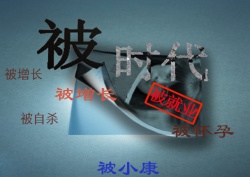“Passive era”的版本间的差异
来自China Digital Space
| 第3行: | 第3行: | ||
[[File:Eraofpassivetense.jpg|250px|thumb|right|''Will you be “made [http://en.wikipedia.org/wiki/Xiaokang relatively well-off],” or will you be “suicided”?'']] A time when euphemistic labels are given to actions that belie the underlying compulsion behind those actions—that is, the present. | [[File:Eraofpassivetense.jpg|250px|thumb|right|''Will you be “made [http://en.wikipedia.org/wiki/Xiaokang relatively well-off],” or will you be “suicided”?'']] A time when euphemistic labels are given to actions that belie the underlying compulsion behind those actions—that is, the present. | ||
| − | In Chinese, the grammatical construction 被X (bèi-X) means “to be X-ed,” and implies that that the X-ed party is unwilling or will suffer from the effects of X. For example, someone invited to [[drink tea]] (i.e. called in by the police for interrogation) could say she “was tea-drinked” (被喝茶 bèi hé chá). This has given rise to the “passive era.” | + | In Chinese, the grammatical construction [[be X-ed|被X (bèi-X)]] means “to be X-ed,” and implies that that the X-ed party is unwilling or will suffer from the effects of X. For example, someone invited to [[drink tea]] (i.e. called in by the police for interrogation) could say she “was tea-drinked” (被喝茶 bèi hé chá). This has given rise to the “passive era.” |
See also [[be X-ed]]. | See also [[be X-ed]]. | ||
[[Category: Grass-Mud Horse Lexicon]] | [[Category: Grass-Mud Horse Lexicon]] | ||
2014年8月27日 (三) 17:52的版本
被时代 (bèi shídài): passive era

Will you be “made relatively well-off,” or will you be “suicided”?
A time when euphemistic labels are given to actions that belie the underlying compulsion behind those actions—that is, the present.
In Chinese, the grammatical construction 被X (bèi-X) means “to be X-ed,” and implies that that the X-ed party is unwilling or will suffer from the effects of X. For example, someone invited to drink tea (i.e. called in by the police for interrogation) could say she “was tea-drinked” (被喝茶 bèi hé chá). This has given rise to the “passive era.”
See also be X-ed.




